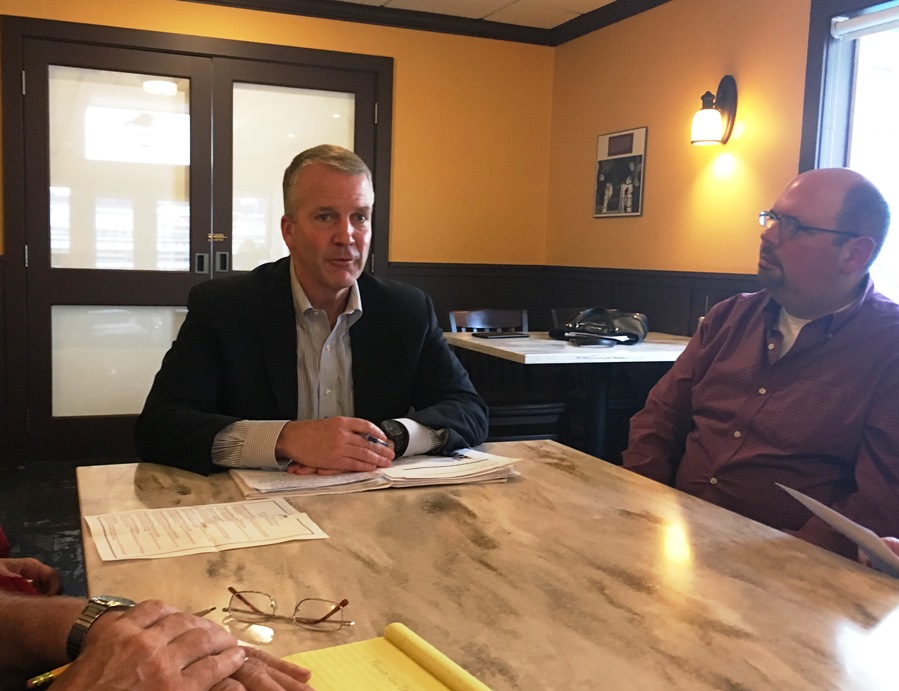
Sen. Dan Sullivan (R-AK), talks about proposed tax reforms during a roundtable discussion Wednesday with business leaders in Ketchikan. (KRBD photo by Leila Kheiry)
Alaska’s Sen. Dan Sullivan was in Ketchikan on Wednesday afternoon, part of a tour through Southeast Alaska. While in the First City, Sullivan met with representatives of local businesses to talk about Republican proposals for reforming the federal income tax system.
Here’s a summary of the approximately one-hour roundtable discussion.
Sen. Dan Sullivan met with business leaders in Juneau and Sitka before flying in to Ketchikan. About a dozen residents mostly from the real estate and financial industry, listened to Sullivan’s presentation about the tax reform proposals, and provided their input on those ideas.
Sullivan told the group that his goal with any kind of tax reform is economic growth throughout the nation. He said that while some places have seen growth, much of the United States has not.
“My view is if you can grow at 3-3.5, anything above 3 percent, that’s probably the most important thing for the country right now,” he said.
Sullivan believes that tax reform has a better chance at passing the U.S. Senate than health care reform, which has failed after repeated attempts.
“I think in terms of tax, if you look at a lot of what’s in this proposal, these are things that Democrats have been talking about for years,” he said. “These are things that President Obama gave speeches on. Ron Wyden, he’s the ranking (Democrat) member on the finance committee from Oregon. He had a bill that agreed to almost all of the stuff in this framework.”
And it is just a framework now, Sullivan said; what’s in the current tax-reform proposal is not set in stone. He said it most likely will change as it moves through the process. But, he hopes Congress will have something approved by the end of the year.
And what’s in that framework? For businesses, it would lower the tax rate for small businesses to 25 percent; and lower the corporate tax rate to 20 percent.
For personal income tax, the framework reduces the number of brackets from seven to three. So, the lowest tax rate would be 12 percent, slightly higher than it is now. The middle one would be 25 percent, and the highest 35 percent. Incomes levels covered by those brackets have not been established.
The framework also doubles the standard deduction. And it removes many itemized deductions. That includes credit for state and local taxes. So, if someone pays state income tax, or local sales or property tax, those no longer would be eligible for a federal income tax deduction.
“I think that kind of subsidizes the big-spending states that have high income taxes,” he said of the credit. “If that deduction were removed, that would be estimated over $1.25 trillion over 10 years additional revenue to the Treasury Department.”
The framework would not remove deductions for charitable contributions or mortgage interest. But it does call for repealing the estate tax, sometimes referred to as the “death tax.”
Jim Dahl owns a local investment firm. He said he is in favor of most of the provisions in the framework. The only items he doesn’t like are removing the deduction for state and local taxes, and eliminating the estate tax.
Dahl said the current estate tax doesn’t kick in until the amount to be transferred exceeds about $5.5 million. He said eliminating that cap mostly would benefit very wealthy people.
“The simple fact is that most average Americans have a net worth of less than $5 million,” Dahl said. “And the few at the top, the 1 percent that have the bazillions, are avoiding taxation.”
Sullivan said that particular part of the proposal is controversial, and could be one of the items that changes.
Randy Johnson of Tyler Rental said he would like to see some kind of reform, at least, for the estate tax.
“From a small-business owner perspective, who has hope of transferring a small business to future generations of my family, it is a big issue,” Johnson said.
He said he’d like to see more and better options to make sure businesses with assets that may exceed the cap can remain intact when they’re passed down.
Sullivan and Dahl agreed that perhaps estate tax reform, rather than elimination, would be a good compromise.
Pastor John Jepson of Gateway Baptist Church suggested one way the federal government could save money: vouchers to parents for half the amount provided to public schools through the federal government. Parents then could use those vouchers to help send their kids to private schools, including religious schools like the one he administers.
“I don’t know legality – some people say you can some people say you can’t. Church and state and all this other stuff,” Jepson said. “All that aside, parents need to be able to exercise this option if they had it. A lot of them can’t right now, but maybe they could then. And it would save the federal government money.”
Sullivan said an amendment that would have allowed something like that on the federal level failed, so that option is not available now.
Local CPA Scott Milner said the tax-reform framework is useful, but more details are needed to know the true impact. He said the most beneficial thing that Sullivan and other lawmakers can do to stimulate the economy is reduce regulations. Sullivan heartily agreed.
Also attending the roundtable were Bill Bolling of Gateway City Realty; Mary Wanzer of Coastal Real Estate; Roger Stone, a former real estate business owner; Bill Moran and Jim Sarvela of First Bank; Ed Zastrow of the local AARP chapter; and Terry Mahoney with Liberty Tax.
Senator Sullivan also sat down briefly with local reporters. During that interview, he talked about national defense and healthcare reform. We’ll have a later report from that discussion.





